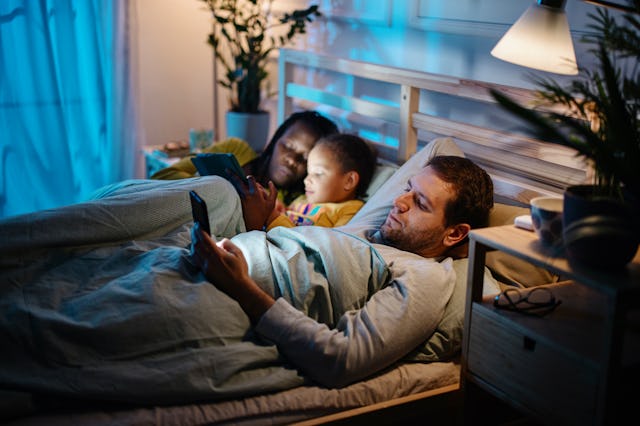Our Tween Still Comes Into Our Bedroom To Sleep. How Do We Get Our Bed Back?
It’s usually about more than being afraid of the dark.

Co-sleeping with your kid is a tradition and practice that many families embrace for various reasons, and one that you might think will eventually stop when your child hits a certain age. But what if your tween is still coming into our bedroom at night? After all, sleeping with a toddler is much different than sharing a bed with a 12-year-old. They take up much more room than they did when they were little, for starters — and if you’re being honest, you probably thought you could have your bed back once they got a little older.
Not surprisingly, you might also be concerned about why your tween continues to sleep with you. Is it healthy? How do you break them of the habit? When should you seek help? Read on for advice from sociologist Sarah Melancon, Ph.D.
What are the most common reasons tweens want to sleep with their parents?
According to Melancon, the most common reasons why tweens want to sleep with their parents include:
- Anxiety or anxious attachment
- Fear of the dark
- Struggling with social or other problems at school, with friends, or with their sibling(s)
- Difficult situations, such as the death of a friend or relative, a parent’s serious medical diagnosis, divorce
- Nightmares
What are some issues that can arise?
Most parents don’t want to co-sleep with their kid for life, but Melancon says one benefit that might explain why your tween wants to share a bed with you.
“While in many modern families, each child may have their own bedroom or share with a sibling, our ancestors had limited space, and thus the whole family tended to sleep in the same space,” Melancon explains. “When we are in close proximity to others, our nervous systems pick up on one another’s state in a process called co-regulation. Because we are social beings, it naturally feels good to us when our nervous systems are in alignment with one another and can cause us to release oxytocin (the ‘love hormone’).”
Thus, it may not simply be fears or anxieties that drive your tween towards your bed — “Their nervous system is also likely benefitting from being physically close, helping to ease their worries,” Melancon says.
However, as much as snoring beside you benefits your kid, having a child sleep in your bedroom may feel invasive, which Melancon says is normal. “As adults, we have a need for our own space. Parents need downtime and to ‘turn off’ parent mode to relax and feel like a complete human.”
Additionally, having your tween sleep in your bedroom may interfere with intimacy and your sexuality (whether solo or partnered). Plus, your sleep quality may be disrupted, which could make you feel frustrated, anxious, or irritable.
What are some effective ways to help your tween sleep on their own?
With a little time and TLC, Melancon believes you can help your tween transition to sleeping independently. She recommends setting a boundary firmly yet compassionately that, within a specific timeframe (one to two weeks, etc.), your tween will need to sleep in their own room.
“Share the benefits of the situation — for instance, it has been wonderful to be close and help them to feel safe — and at the same time, this arrangement is, unfortunately, causing stress,” she says, adding, “Give them time to get used to the idea. Allow space for whatever feelings in your child arise without judgment or making them wrong.”
She also suggests asking for their input about what might help them make the transition. “For instance, perhaps for the first week, a parent stays in the room until they fall asleep,” she says. “Together, create a step-by-step plan of what will happen as you both prepare for this change. Talk about it every day to check in and provide reassurance.”
You might also want to create a positive evening routine emphasizing connection to fill up their “emotional cup” before bedtime separation. “The routine must be tailored for your child’s particular interests and needs,” Melancon says. “That might include physical activity (taking a walk, jumping on a trampoline, playing tag, yoga), quieter activities (such as drawing, playing games), and communicating about their day and any feelings that came up.”
Before bed, consider practicing mindfulness together. “Mindfulness may help your tween become aware of their thoughts and feelings, calm anxieties, and be in the present moment,” Melancon explains.
But most importantly, Melancon says it’s important to understand what is happening to your child emotionally when they crawl into bed with you. “Whether they are being bullied at school, having nightmares, or upset about their grandmother’s death — there is always an emotional reason behind their behavior.”
What are some signs your tween is really struggling?
According to Melancon, a child therapist may be helpful:
- If your child has extreme emotional reactions, such as panic attacks, becoming physically violent, or destroying property.
- If your child cooperates but becomes depressed, withdrawn, reduces eating, or develops new problematic behaviors.
- If your tween is consistently unable to fall or stay asleep in their own room.
Remember, there’s zero shame in (a) wanting to reclaim your bed for yourself and (b) in asking for help if you realize your tween coming into your bed at night is about more than just being afraid of the dark. A child therapist can help your kid get to the root of what’s really bothering them so that everyone can rest a little easier at night.